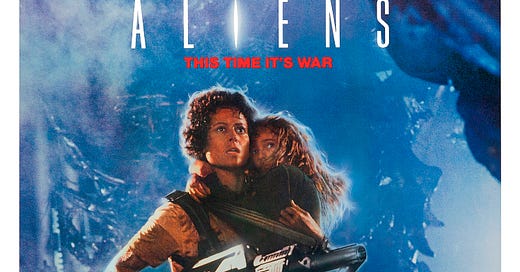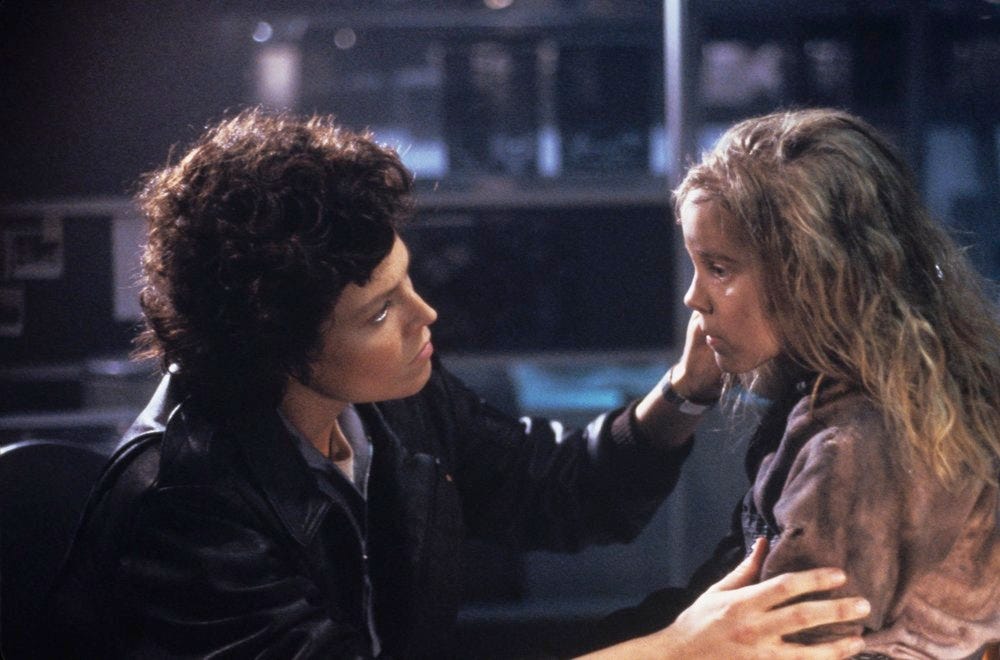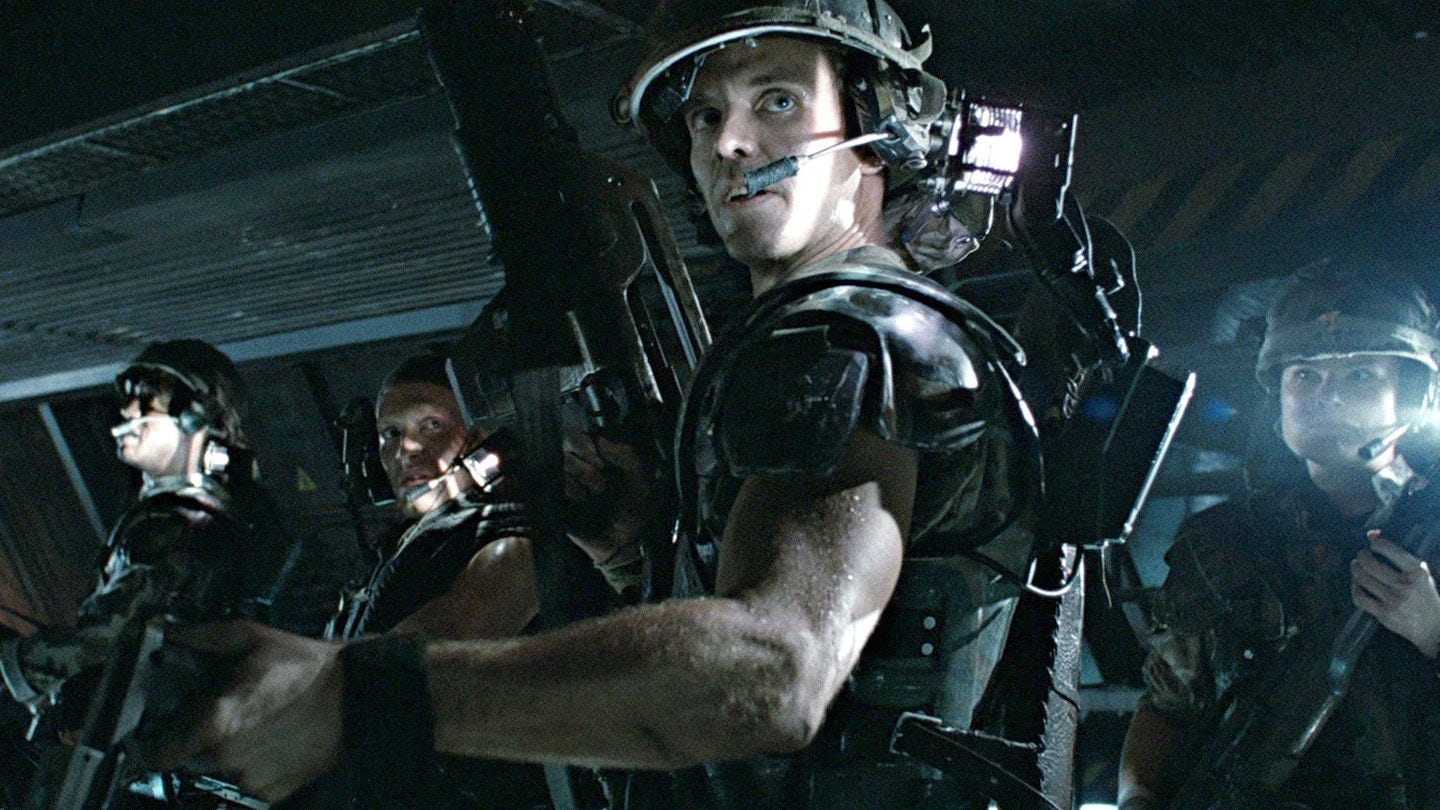The Favourites
Aliens
The first sequel to be featured in The Favourites (with the original film covered here), Aliens is a tremendous accomplishment. Director James Cameron took the eerie and oppressive setting of Ridley Scott’s Alien and shifted the mystery and fear into a rollicking and overwhelming terror. While the original film used shadows and the terror of the unknown as it’s main themes, Aliens focuses on the residual effects of the initial attack and the echoing traumas that ripple outwards from it. Following Ellen Ripley (Sigourney Weaver) as she is made to return to the outpost LV-426 with a group of Colonial Marines in the hopes of saving the colonists, only to discover the asteroid has been completely overrun by xenomorphs. Outnumbered and overwhelmed, our team must do the impossible to survive before all is lost.
While the first film exists squarely as a sci-fi horror masterpiece, the shift into a more obvious action sci-fi scenario does not rob the sequel of the depths of the first. Aliens is a response to the first film, both in the filmmaking and in the character of Ellen Ripley. Her development throughout this film is directly inspired by the terrible things she faced in the first film. From losing her daughter due to being in cryosleep for decades, to her mistrust and eventual friendship with the android Bishop, to her efficient and aggressive actions when dealing with the xenomorphs, Ripley is an active hero instead of the reluctant survivor. While a singular xenomorph is still an exceptional threat, by turning them into an endless hoard Cameron ups the strakes of the first film greatly. While the initial film was about survival of one person in an unforgiving world, Aliens is about the survival of family.
When we first meet Ellen at the start of the film, after she has been woken from cryosleep, she is in a state of post-traumatic stress. Not only has her entire crew been killed (which, to her, feels like it happened yesterday) but she discovers that over half a century has passed. Her daughter, along with everyone else she knew, has died. She spends months waking in cold sweats, anticipating her own chest to burst from the inside. As she finally begins to become accustomed to her new life, she is told that the colony that exists on LV-426 has lost contact. Initially unwilling to make the journey, Ripley chooses to travel back to the outpost after another nightmare. It’s her own decision to go, and it’s driven not by fear but by the belief she knows what to expect. She is choosing to risk her life in order to destroy the xenomorphs.
When on the mission with the colonial marines Ripley again refuses to be a passive observer, even if that’s her official role. When they first land to find a completely abandoned facility, Ripley is constantly telling the marines to stay on their toes and pay attention, much to the chagrin of their commanding officer Lieutenant Gorman. When the encounter the lone survivor Newt it’s Ripley who is able to coax her out of her state of shock. When the mission starts to go array and the marines start being killed, it’s Ripley who takes the action to save the remaining soldiers. Even before all of these, when they have yet to leave the Sulaco she takes the incentive to help the marines with their preparations. She proves her steel and coolness under pressure well before things actually begin to go to hell. She is not just proving to the other people on the voyage but to herself what she is capable of.
As the film progresses, so does Ripley’s belief in herself and what she can do. Initially waking in cold sweats and refusing to go on the trip to LV-426, she ends the film by going head-to-head against the alien queen. Each step along her journey is one further away from the victim she was and closer to an unstoppable force. Her trauma can also be traced through her relationship with the android Bishop (Lance Henriksen). Due to the betrayal of Ash in the first film, Ripley knows that the androids are capable of turning on humans if the Weyland-Yutani company dictates it. As such she initially detests Bishop, believing he will eventually betray them as well. But as the film progresses and Ripley becomes more confident in herself, she is able to see Bishop as a genuine ally. It’s not through naivete or blind trust but through being battle tested and trusting her gut that their relationship is able to be fostered.
This gut instinct she adapts throughout Aliens also plays into one of the other strong themes of the film: maternity. The first thing Ripley discovers upon waking from cryosleep is that her daughter passed of old age only two years prior. Devastated, her loss weighs on her heavily as she tries to adapt to her new reality. No crew, no family, and a company that doesn’t seem to take her concerns seriously, Ripley is more isolated than she has ever been before. That is until she arrives of LV-426 with the marines and discover Newt (Carrie Henn), a young girl who appears to be the only survivor of the colony. Initially combative and mute, Ripley is immediately drawn to the young girl in a motherly way.
Ripley’s interactions with Newt show that she is not just a battle born badass but someone who still contains her innate motherly instinct. Her tone softens, her voice soothes, until Newt opens up herself. She and Ripley are much alike, being the only survivors of their respective xenomorph attacks. Ripley recognizes that Newt is in the same state she was only months prior; fearful, ragged, and willing to do anything and everything to simply survive. It’s this recognition that furthers the bond between the two. Ripley shows Newt that there is life beyond survival and allows her to be a little girl once again, much like this fight against the xenomorphs proves to Ripley she’s more than a survivor. They can see a future with each other, can see beyond the horrors in front of them.
If we include the role Corporal Hicks (Michael Biehn), we can see that Cameron has formed a makeshift nuclear family with our survivors. Hicks is the first Marine to take Ripley’s side and recognize the benefits of having her in the expedition. When they first encounter Newt it’s Hicks that invites Ripley to coax Newt out of her hiding place. He listens to her tactical advise throughout the battle, even before it becomes apparent to everyone that Ripley is the most experienced voice. Though the romance between Hicks and Ripley is mostly subtextual, the chemistry between Weaver and Biehn allows us to a future for the characters. Much like Newt and Ripley can see survival in each other, Ripley and Hicks can see a life beyond survival together.
The morphing of genres from science fiction horror to action horror was another decision that Cameron made that makes the sequel stand on it’s own. While the first film was dripping, dense atmosphere and quiet, tense set pieces, Aliens chooses to be more bombastic and active in it’s storytelling. This allows for bigger, broader characters, such as Private Vasquez (Jenette Goldstein), Private Hudson (Pill Paxton), and Sergeant Apone (Al Matthews). These broader characters allow for a larger cast with less time given to each character, but still enough to understand them. A larger cast gives the action more room to play and gives us bigger and better sequences. It was a way to up the stakes from the first film while allowing Cameron time for emotional investment.
The film draws much of it’s action sequences and ideas from the American involvement in the Vietnam War. The perceived technologically superior Colonial Marines coming into enemy territory cocky and unaware, only to be almost entirely wiped out immediately. As they are quickly dispatched, their chain of authority evaporates and it becomes apparent that this is not a battle a traditional fight could contain. The action puts brains above authority and even then our capable characters can quickly become incubators for the xenomorphs. While Alien is about the fear of the future and the evils of unrepentant capitalism, Aliens focuses on the dangers of American foreign policy and colonialism.
Aliens still carries over the theme of the dangers of unbridled capitalism of the first film, but by shifting genres and injecting the further theme of colonial expansion it is able to build on the thematic throughlines find in all Alien films. Xenomorphs are the ultimate colonialists for they don’t take your land but your body. They are parasites in need of a host, and they take on characteristics of their host after using them to gestate their spawn. This mimics colonialism in how invading cultures will first overtake a place and then claim the traditions as their own. So when the Marines underestimate the mission they are confronted with a mirror, the actions they have taken elsewhere now being reflected back upon them.
Almost all these themes being benchmarks for the Alien franchise. While never frequenting the exact same story or beats, echoes of the subtext established by Cameron in Aliens are felt in all future films. Whether they explore the innate sense of motherhood that Ripley carries with her, the fear of a world run by capitalism, or the dangers of the colonialist mindset, Aliens brought a unique and entertaining viewpoint to all these subjects. Balancing a variety of important social stances while also being an incredible action film is no easy task, and Cameron deserves the credit. Genre fare is more able to explore the depths of our world than many allow it to, and it’s one of the greatest things about discussing and considering film; what’s the best way to tell this story, and to say what needs to be said? That’s what was accomplished with Aliens.






